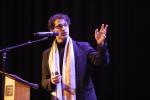
Elites, Emotions, and Extremism: Insights with McDoom
On the 1st of December, the NIOD invited Dr. Omar Shahabudin McDoom from the London School of Economics to provide this year’s edition of its annual lecture on Holocaust and Genocide Studies. Entitled Elites, Emotions, and Extremism in Genocides and Mass Killings: Insights from Rwanda, McDoom’s lecture addressed three key debates within the discipline; and at the hands of original evidence gathered during his own research in post-genocide Rwanda, provided thought-provoking conclusions for an audience of scholars, students, and diplomats.
Genocide: from above, or below?
A discussion which continues to trouble many analyses of mass violence is whether or not genocide is a phenomen of which the roots lie in the state and its elites, or among people themselves. Both positions seem irreconcilable. By positing the first, scholars risk absolving entrenched cultures of repression and exclusion, while positing the latter may underestimate the influence elites have on their respective societies.
McDoom argues that a binary is counterproductive. Referring to Rwanda, McDoom demonstrates that while mass violence broke out almost immediately after the assassination of President Habiyarmana; this did not coincide directly with the capture of the Rwandan state by the extremist Akazu, which in fact occurred six days afterwards. During this early period, violence was mainly organised by uneducated farmers, often in areas not yet under extremist control.
The Akazu would later build on this, their actions ultimately far more consequential in shaping the trajectory of the genocide. As such, McDoom asks for a reconsideration of the above-below binary, and its replacement with an understanding of genocide as a collaborative act, organised and perpetrated by a coalition of extremist elites and ordinary people.
Radicalisation: a-priori, or part and parcel?
The perpetration of violence, and its relation to processes of radicalisation were also tackled by McDoom. Presenting testimonies from a variety of regions and areas in Rwanda, McDoom sketched an intriguing picture of how various individuals reacted to committing acts of extreme violence.
One memorable testimony related that while the interviewee had witnessed an acquaintance steal and murder reluctantly in the beginning of the genocide, they eventually began to do so voluntarily, with increasing cruelty and frequency weeks later.
McDoom posited two interesting hypotheses to explain such findings. Firstly, that violence is a transformative force, and secondly, that the causal direction of radicalisation itself is not linear (as much of the literature claims) but multifaceted. According to McDoom, radicalisation can be as much the product of indoctrination prior to committing acts of violence, as it can be of peer pressure during, and denial after those same acts. A person may hate first then kill, but also ‘kill first, and hate later’.
Rationality, Emotion, and Mass Violence
Finally, McDoom reflected on whether genocide and mass violence are products of reason or emotion. Synthesising both the rationalist and expressivist schools of thought in contemporary literature, McDoom argued that mass violence and genocide are in fact often the product of an interplay between both factors.
To demonstrate, McDoom directed the audience’s attention to Theoneste Bagosora’s decision to resume hostilities against the RPF in April 1994. Sifting through both rationalist and expressivist interpretations of Bagosora’s decision with the audience, McDoom concluded that Bagosora’s decision to return to armed conflict was one which involved a great deal of organisation and strategising, but was marred by deep-rooted hatred, fear of persecution, and prejudice.
McDoom’s conclusion does away with the caricature of the perpetrator as a purely rational vessel for predetermined plans of mass destruction, instead exposing them as ordinary humans often clouded in judgement by strong emotions such as hate and fear.
Accountability
In his final statements, McDoom built on his previous conclusions to urge aspiring researchers to acknowledge the critical role which scholars have in acting on information about genocide and mass violence. Touting that the ‘most significant consequence for extremists is accountability’, McDoom called for aspiring scholars to direct all the energies of the field to altering the calculus of perpetrators, by making them too afraid of consequences to act on their grim schemes.
These statements inspired a sense of purpose, but also a need for reflection among those in attendance. How should scholars seek to act on the knowledge they possess? Are the institutions we currently have in place enough to truly affect such results? Should these institutions be changed, disbanded, or replaced? Is the threat of documentation on its own already enough to halt potential perpetrators?
McDoom’s presentation was emblematic of the labour all scholars of genocide, including those at the NIOD, are asked to engage in. Throughout this year's edition of the annual lecture, attendees were demonstrated the depth of the work already achieved by the field, the benefit of questioning and re-phrasing its most salient debates, and the importance of pushing it further into new directions. And for those youngest among the audience, the great responsibility which seeking knowledge entails.